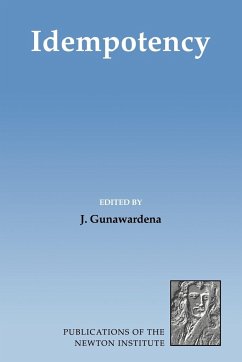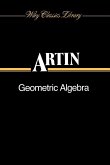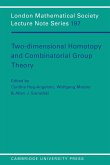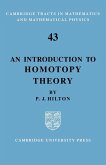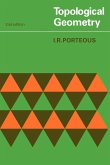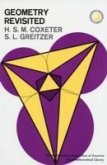- Broschiertes Buch
- Merkliste
- Auf die Merkliste
- Bewerten Bewerten
- Teilen
- Produkt teilen
- Produkterinnerung
- Produkterinnerung
A survey of idempotency, the developing area of mathematics.
Andere Kunden interessierten sich auch für
![Geometric Algebra Geometric Algebra]() E. ArtinGeometric Algebra267,99 €
E. ArtinGeometric Algebra267,99 €![Surfaces Surfaces]() H. Brian GriffithsSurfaces41,99 €
H. Brian GriffithsSurfaces41,99 €![Two-Dimensional Homotopy and Combinatorial Group Theory Two-Dimensional Homotopy and Combinatorial Group Theory]() Cynthia Hog-Angeloni / Wolfgang Metzler / J. Sieradski (eds.)Two-Dimensional Homotopy and Combinatorial Group Theory77,99 €
Cynthia Hog-Angeloni / Wolfgang Metzler / J. Sieradski (eds.)Two-Dimensional Homotopy and Combinatorial Group Theory77,99 €![An Introduction to Homotopy Theory An Introduction to Homotopy Theory]() Peter J. HiltonAn Introduction to Homotopy Theory56,99 €
Peter J. HiltonAn Introduction to Homotopy Theory56,99 €![Topological Geometry Topological Geometry]() I. R. PorteousTopological Geometry74,99 €
I. R. PorteousTopological Geometry74,99 €![Geometry Revisited Geometry Revisited]() H S M CoxeterGeometry Revisited47,99 €
H S M CoxeterGeometry Revisited47,99 €![An Essay on the Foundations of Geometry An Essay on the Foundations of Geometry]() Bertrand A. W. RussellAn Essay on the Foundations of Geometry62,99 €
Bertrand A. W. RussellAn Essay on the Foundations of Geometry62,99 €-
-
-
A survey of idempotency, the developing area of mathematics.
Hinweis: Dieser Artikel kann nur an eine deutsche Lieferadresse ausgeliefert werden.
Hinweis: Dieser Artikel kann nur an eine deutsche Lieferadresse ausgeliefert werden.
Produktdetails
- Produktdetails
- Verlag: Cambridge University Press
- Seitenzahl: 456
- Erscheinungstermin: 30. November 2007
- Englisch
- Abmessung: 229mm x 152mm x 27mm
- Gewicht: 735g
- ISBN-13: 9780521055383
- ISBN-10: 0521055385
- Artikelnr.: 23364811
- Herstellerkennzeichnung
- Libri GmbH
- Europaallee 1
- 36244 Bad Hersfeld
- gpsr@libri.de
- Verlag: Cambridge University Press
- Seitenzahl: 456
- Erscheinungstermin: 30. November 2007
- Englisch
- Abmessung: 229mm x 152mm x 27mm
- Gewicht: 735g
- ISBN-13: 9780521055383
- ISBN-10: 0521055385
- Artikelnr.: 23364811
- Herstellerkennzeichnung
- Libri GmbH
- Europaallee 1
- 36244 Bad Hersfeld
- gpsr@libri.de
Foreword; Preface; List of participants; 1. An introduction to idempotency
Jeremy Gunawardena; 2. Tropical semirings Jean-Eric Pin; 3. Some
automata-theoretic aspects of min-max-plus semirings Daniel Krob; 4. The
finite power property for rational sets of a free group Flavio d'Alessandro
and Jacques Sakarovitch; 5. The topological approach to the limitedness
problem on distance automata Hing Leung; 6. Types and dynamics in partially
additive categories Gianfranco Mascari and Marco Pedicini; 7. Task resource
models and (max,+) automata Stéphane Gaubert and Jean Mairesse; 8.
Algebraic system analysis of timed Petri nets Guy Cohen, Stéphane Gaubert
and Jean-Pierre Quadrat; 9. Ergodic theorems for stochastic operators and
discrete event networks François Baccelli and Jean Mairesse; 10.
Computational issues in recursive stochastic systems Bruno Gaujal and Alain
Jean-Marie; 11. Periodic points of nonexpansive maps Roger D. Nussbaum; 12.
A system-theoretic approach for discrete-event control of manufacturing
systems Ayla Gürel, Octavian C. Pastravanu and Frank L. Lewis; 13.
Idempotent structures in the supervisory control of discrete event systems
Darren D. Cofer and Vijay K. Garg; 14. Maxpolynomials and discrete-event
dynamic systems Raymond A. Cunninghame-Green; 15. The Stochastic HJB
equation and WKB method Vassili N. Kolokoltsov; 16. The Lagrange problem
from the point of view of idempotent analysis Serguei Samborskii; 17. A new
differential equation for the dynamics of the Pareto sets Vassili N.
Kolokoltsov and Victor P. Maslov; 18. Duality between probability and
optimization Marianne Akian, Jean-Pierre Quadrat and Michel Viot; 19.
Maslov optimization theory: topological aspects Pierre Del Moral; 20.
Random particle methods in (max,+) optimization problems Pierre Del Moral
and Gérard Salut; 21. The geometry of finite dimensional pseudomodules
Edouard Wagneur; 22. A general linear max-plus solution technique Elizabeth
A. Walkup and Gaetano Borriello; 23. Axiomatics of thermodynamics and
idempotent analysis Victor P. Maslov; 24. The correspondence principle for
idempotent calculus and some computer applications Grigori L. Litvinov and
Victor P. Maslov.
Jeremy Gunawardena; 2. Tropical semirings Jean-Eric Pin; 3. Some
automata-theoretic aspects of min-max-plus semirings Daniel Krob; 4. The
finite power property for rational sets of a free group Flavio d'Alessandro
and Jacques Sakarovitch; 5. The topological approach to the limitedness
problem on distance automata Hing Leung; 6. Types and dynamics in partially
additive categories Gianfranco Mascari and Marco Pedicini; 7. Task resource
models and (max,+) automata Stéphane Gaubert and Jean Mairesse; 8.
Algebraic system analysis of timed Petri nets Guy Cohen, Stéphane Gaubert
and Jean-Pierre Quadrat; 9. Ergodic theorems for stochastic operators and
discrete event networks François Baccelli and Jean Mairesse; 10.
Computational issues in recursive stochastic systems Bruno Gaujal and Alain
Jean-Marie; 11. Periodic points of nonexpansive maps Roger D. Nussbaum; 12.
A system-theoretic approach for discrete-event control of manufacturing
systems Ayla Gürel, Octavian C. Pastravanu and Frank L. Lewis; 13.
Idempotent structures in the supervisory control of discrete event systems
Darren D. Cofer and Vijay K. Garg; 14. Maxpolynomials and discrete-event
dynamic systems Raymond A. Cunninghame-Green; 15. The Stochastic HJB
equation and WKB method Vassili N. Kolokoltsov; 16. The Lagrange problem
from the point of view of idempotent analysis Serguei Samborskii; 17. A new
differential equation for the dynamics of the Pareto sets Vassili N.
Kolokoltsov and Victor P. Maslov; 18. Duality between probability and
optimization Marianne Akian, Jean-Pierre Quadrat and Michel Viot; 19.
Maslov optimization theory: topological aspects Pierre Del Moral; 20.
Random particle methods in (max,+) optimization problems Pierre Del Moral
and Gérard Salut; 21. The geometry of finite dimensional pseudomodules
Edouard Wagneur; 22. A general linear max-plus solution technique Elizabeth
A. Walkup and Gaetano Borriello; 23. Axiomatics of thermodynamics and
idempotent analysis Victor P. Maslov; 24. The correspondence principle for
idempotent calculus and some computer applications Grigori L. Litvinov and
Victor P. Maslov.
Foreword; Preface; List of participants; 1. An introduction to idempotency
Jeremy Gunawardena; 2. Tropical semirings Jean-Eric Pin; 3. Some
automata-theoretic aspects of min-max-plus semirings Daniel Krob; 4. The
finite power property for rational sets of a free group Flavio d'Alessandro
and Jacques Sakarovitch; 5. The topological approach to the limitedness
problem on distance automata Hing Leung; 6. Types and dynamics in partially
additive categories Gianfranco Mascari and Marco Pedicini; 7. Task resource
models and (max,+) automata Stéphane Gaubert and Jean Mairesse; 8.
Algebraic system analysis of timed Petri nets Guy Cohen, Stéphane Gaubert
and Jean-Pierre Quadrat; 9. Ergodic theorems for stochastic operators and
discrete event networks François Baccelli and Jean Mairesse; 10.
Computational issues in recursive stochastic systems Bruno Gaujal and Alain
Jean-Marie; 11. Periodic points of nonexpansive maps Roger D. Nussbaum; 12.
A system-theoretic approach for discrete-event control of manufacturing
systems Ayla Gürel, Octavian C. Pastravanu and Frank L. Lewis; 13.
Idempotent structures in the supervisory control of discrete event systems
Darren D. Cofer and Vijay K. Garg; 14. Maxpolynomials and discrete-event
dynamic systems Raymond A. Cunninghame-Green; 15. The Stochastic HJB
equation and WKB method Vassili N. Kolokoltsov; 16. The Lagrange problem
from the point of view of idempotent analysis Serguei Samborskii; 17. A new
differential equation for the dynamics of the Pareto sets Vassili N.
Kolokoltsov and Victor P. Maslov; 18. Duality between probability and
optimization Marianne Akian, Jean-Pierre Quadrat and Michel Viot; 19.
Maslov optimization theory: topological aspects Pierre Del Moral; 20.
Random particle methods in (max,+) optimization problems Pierre Del Moral
and Gérard Salut; 21. The geometry of finite dimensional pseudomodules
Edouard Wagneur; 22. A general linear max-plus solution technique Elizabeth
A. Walkup and Gaetano Borriello; 23. Axiomatics of thermodynamics and
idempotent analysis Victor P. Maslov; 24. The correspondence principle for
idempotent calculus and some computer applications Grigori L. Litvinov and
Victor P. Maslov.
Jeremy Gunawardena; 2. Tropical semirings Jean-Eric Pin; 3. Some
automata-theoretic aspects of min-max-plus semirings Daniel Krob; 4. The
finite power property for rational sets of a free group Flavio d'Alessandro
and Jacques Sakarovitch; 5. The topological approach to the limitedness
problem on distance automata Hing Leung; 6. Types and dynamics in partially
additive categories Gianfranco Mascari and Marco Pedicini; 7. Task resource
models and (max,+) automata Stéphane Gaubert and Jean Mairesse; 8.
Algebraic system analysis of timed Petri nets Guy Cohen, Stéphane Gaubert
and Jean-Pierre Quadrat; 9. Ergodic theorems for stochastic operators and
discrete event networks François Baccelli and Jean Mairesse; 10.
Computational issues in recursive stochastic systems Bruno Gaujal and Alain
Jean-Marie; 11. Periodic points of nonexpansive maps Roger D. Nussbaum; 12.
A system-theoretic approach for discrete-event control of manufacturing
systems Ayla Gürel, Octavian C. Pastravanu and Frank L. Lewis; 13.
Idempotent structures in the supervisory control of discrete event systems
Darren D. Cofer and Vijay K. Garg; 14. Maxpolynomials and discrete-event
dynamic systems Raymond A. Cunninghame-Green; 15. The Stochastic HJB
equation and WKB method Vassili N. Kolokoltsov; 16. The Lagrange problem
from the point of view of idempotent analysis Serguei Samborskii; 17. A new
differential equation for the dynamics of the Pareto sets Vassili N.
Kolokoltsov and Victor P. Maslov; 18. Duality between probability and
optimization Marianne Akian, Jean-Pierre Quadrat and Michel Viot; 19.
Maslov optimization theory: topological aspects Pierre Del Moral; 20.
Random particle methods in (max,+) optimization problems Pierre Del Moral
and Gérard Salut; 21. The geometry of finite dimensional pseudomodules
Edouard Wagneur; 22. A general linear max-plus solution technique Elizabeth
A. Walkup and Gaetano Borriello; 23. Axiomatics of thermodynamics and
idempotent analysis Victor P. Maslov; 24. The correspondence principle for
idempotent calculus and some computer applications Grigori L. Litvinov and
Victor P. Maslov.

